

Tao Te Ching
Search Sages
Enter all or part of an sage's name or biography in the fields below, then press tab or enter to filter the list of Authors. Click the headings Name or Biography to sort by that column. Diacritics are ignored when searching.
Click on the author's name to go to their page.
| Author Name | Biography |
|---|---|
| Salman Rushdie | 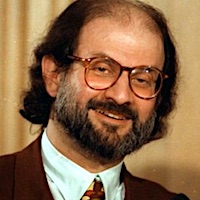 Salman Rushdie Salman RushdieFearless antagonist of Islamic fundamentalism Prolific, award-winning, and fearless writer, Rushdie’s novels combine magical realism with historical fiction and concentrate on the interplays between Western and Eastern civilization. An antagonist of religious extremism and advocate for Islamic reform, his books were banned in many Muslim countries, he was put on an Al-Qaeda hit list, and the spiritual leader of Iran—Ayatollah Khomeini—issued a fatwā ordering his execution. When knighted on the English Queen’s birthday in 2007, mass demonstrations against him broke out in Malaysia and Pakistan while many Muslims campaigned publicly for his death. He supported Barack Obama’s election and the UK vote to stay in the EU, criticizes the Republican Party, champions ways to end racial discrimination, and actively supports feminism. |
| Shabkar Tsokdruk Rangdrol | 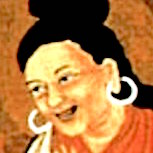 Shabkar Tsokdruk Rangdrol Shabkar Tsokdruk RangdrolProlific writer said to have written over 300 pages per day, famous lama, and student of the Mongolian king Chögyal Ngakgi Wangpo; Shabkar literally means “white feet,” a name given to him because his presence was so inspiration that it wherever he placed his feet became full of virtue and realization. Considered a reincarnation of Milarepa, he spent most of his life in retreats and composed “an ocean of songs.” |
| James Legge | 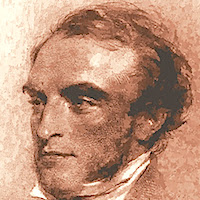 James Legge James LeggeProlific translator, editor of the first Chinese newspaper in Hong Kong, publisher of the first major volume of Chinese poetry into English, first Professor of Chinese at Oxford University, Christian missionary to China for 33 years; Legge helped translate the extensive Sacred Books of the East series, 50 volumes of Chinese classics. His purpose in this though was to provide knowledge and understanding to Christian missionaries so that they could better convert Chinese so his translations easily became corrupted by his strong sectarian point of view. In spite of these flaws, his work helped make great strides in helping “West meet East.” |
| Hubert Reeves | 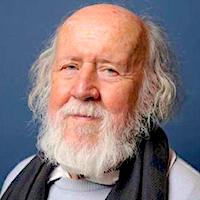 Hubert Reeves Hubert ReevesProlific science popularizer, professor, NASA advisor, and successful Director of Research; Reeves continues to lead a long and productive life dedicated to avoiding scientific pitfalls and encouraging a sane and wise approach to scientific development. A good example of how science can blend and merge with spiritual understanding—like Aldous Huxley's more philosophical concluding realization—Reeves summarizes his scientific understanding with the recognition that the most important priority in life is to be kind and help people. |
| Clinton Heylin | 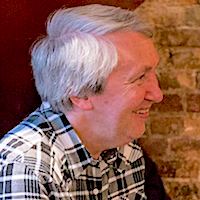 Clinton Heylin Clinton HeylinProlific English author focused on Bob Dylan and popular music in general. |
| Lù Jiǔyuān | 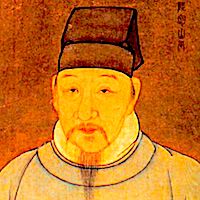 Lù Jiǔyuān Lù JiǔyuānProfessor, magistrate, and half of the most famous debate in Chinese history during a time when the influence between Taoism, Buddhism and Confucianism was being re-balanced; Lu Hsiang Shan led a simple but profound life. His philosophy of Universal Mind was forgotten for almost 300 years but then—revived by Wang Yangming—became the second most influential school and a major influence on neo-Confucianism. He developed Mencius' concept of the basic goodness of original mind and brought the simplicity and spontaneity of Daoism and the problems with desire from Buddhism into the blend with Confucianism that became neo-Confucianism. |
| Matthew J. Bruccoli | 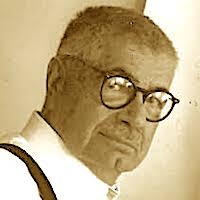 Matthew J. Bruccoli Matthew J. Bruccoli Professor, author, leading expert on F. Scott Fitzgerald; Bruccoli also wrote about other famous authors and helped write and publish the Dictionary of Literary Biography—a 400-volume biographical reference on over12,000 authors. |
| James Paradis | 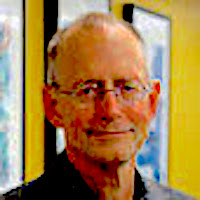 James Paradis James ParadisProfessor of writing and comparative media studies, author, and philosopher; Paradis concentrates on issues like the public reception and popularization of science, vernacular culture, and the representation of various kinds of expertise in the media. |
| Gilbert Seldes | 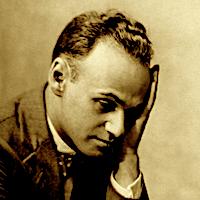 Gilbert Seldes Gilbert SeldesMaker of the first full-length documentary film Producer, author, critic, director, editor, and educator; Seldes created an immeasurable impact on Western Civilization with his insightful critiques and comments on popular American culture, cultural democracy, and popular history. The first CBS News television director, he pioneered innovative approaches to media and entertainment, hosted popular TV shows, created the the first full-length documentary film; wrote, directed and produced many educational programs. He praised Ernest Hemingway but only earned his disdain; strongly criticized F. Scott Fitzgerald's work but remained close friends. He helped legitimize popular entertainment but called soap operas 'corrupting influences’. An influential advocate for fairness and balance in reporting, his efforts delayed but unfortunately could not prevent the rise of propaganda-TV like Fox News. |
| Proclus Lycaeus | 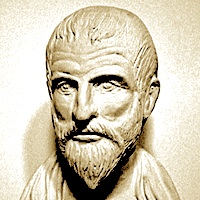 Proclus Lycaeus Proclus Lycaeus"The most influential Ancient Greek philosopher you've never heard of" Proclus synthesized Greek philosophy into one system, developed Neoplatonism to its height, and became an important influence on Western medieval philosophy as well as philosophy as a whole. He believed that Plato was divinely inspired and wrote extensive commentaries. He described philosophy as a primary method for raising consciousness above materialism and as a step toward “unification with the One.” With insight into the process of discovering the meaning beneath the sense, he advocated using words to see through the limitation of words and to discover the deeper reality. An inspiration for Ralph Waldo Emerson and the New England Transcendentalists, he taught the Platonic emphasis on “the One,” “Intellect,” and the “Soul.” |
| Confucius | 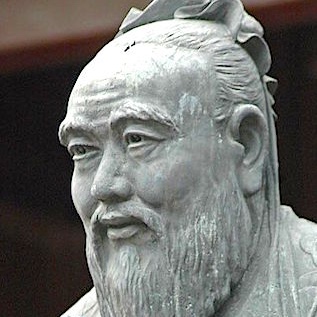 Confucius ConfuciusHistory's most influential "failure" Probably the most influential failure in history, Confucius wanted to be a political advisor, found only one job doing that but unsuccessfully as was the rest of his life attempts at being an administrator. Early Confucian scholars were killed and their books burned. After he died though, his teaching shaped the next 2300 years of Chinese educational, governmental, and cultural practice. He was the first in recorded history to set up an educational program to train people for governmental roles. Calling himself a "transmitter who invented nothing,” his tradition did not become a religion but instead a non-theistic, humanistic understanding of secular morality that stressed having rulers appointed based on merit rather than birth, rule by personal example rather than fiat, acting out of awareness and experience rather than only following rules. |
| Lavinia | 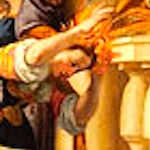 Lavinia LaviniaProphetess and co-foundrer of the Roman Empire Probably a legendary figure but “where there’s smoke, there’s fire” and Lavinia’s symbolic meaningfulness rates her place here. Co-foundress of the Roman Empire, prophetess, daughter of a king, wife of Aeneas, made famous by Virgil, Dante and Ursula Le Guin; Lavinia helped continue the Trojan traditions and ruled “behind the throne” for her too-young-to rule son with Aeneas, Ascanius whose progeny Romulus and Remus established Rome. She represents convergence and appreciating diversity rather than allegiance to narrow sectarianism. The symbol of her hair catching on fire foreshadows both the brilliance and violence of the Roman empire. |
| Marie Bonaparte | 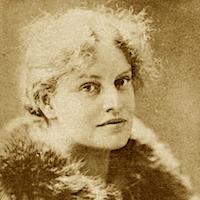 Marie Bonaparte Marie BonapartePrincess, psychoanalyst, sex scientist Princess of Greece and Denmark, author, psychoanalyst, granddaughter of Napoleon’s younger brother and the main Monte Carlo real-estate developer; Marie Bonaparte used her wealth to help Freud escape from Nazi Germany as well as significantly increase the popularity of psychoanalysis. Because of multiple phobias and hypochondria when she was young, she spent much of her time alone reading, studying, and working with the scientific method. This research continued after her marriage and multiple affairs failed to give her orgasms and she did many studies that finally brought her to Freud and his famous comment to her, "The great question that has never been answered and which I have not yet been able to answer, despite my thirty years of research into the feminine soul, is 'What does a woman want?’”. A practicing psychoanalyst, she founded the French Institute of Psychoanalysis, translated Freud’s books into French, wrote several of her own on psychiatry as well as a biography and commentary on Edgar Allan Poe. |
| Madame de Staël | 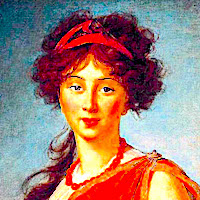 Madame de Staël Madame de Staël"The greatest woman of her time" Powerful political advocate, “first woman of Europe,” fascinating conversationalist, "Napoleon's Nemesis," and preeminent authoress of the time; Madame de Staël inspired and encouraged the political opposition to the Reign of Terror and later to Napoleon and was banished for her efforts. A potent influence on European Romanticism and persuasive advocated of liberty, she sponsored and led salons, wrote novels, and important speeches. Praised by Tolstoy, her political influence advanced representative government, constitutionalism, and women’s rights. Her opposition to dictatorship brought her into intense conflict with Napoleon and she was considered—along with England and Russia—one of the 3 main forces against him. Struggling with opium addiction and suicidal depression, a close friendship with Juliette Récamier enabled her to continue and become—in Macaulay’s phrase—“the greatest woman of her time.” |
| Deepak Malhotra | 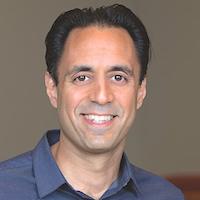 Deepak Malhotra Deepak Malhotra"Professor of the Year" Popular Harvard business school professor, award-winning author, and influential consultant; Deepok Malhotra also works with governments making serious steps and plans to prevent and end warfare. |
| Huizong | 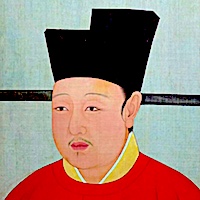 Huizong HuizongGreat artist, failed ruler Polymath, poet, musician, called “one of the greatest Chinese artists of all time,” but an incompetent leader taking disastrous advice to disastrous results; Huizong demonstrated the difficulty of blending art and politics. Collecting over 6000 paintings, he sponsored artists, wrote poems, painted, reformed court music, and wrote dissertations on Taoism, tea ceremony, and medicine. His foreign policy decisions however and military neglect led to a Jurchen invasion and the ending of the Song Dynasty, his demotion to commoner status, and the last 8 years of his life spent as the “Besotted Duke" jailed in a remote, cold province prison. He promoted monumental philanthropic efforts including founding orphanages, hospitals, and schools; but, his failure to balance his religious Taoism with the Confucian mainstream prevented the maintenance of a strong government. |
| Leibniz | 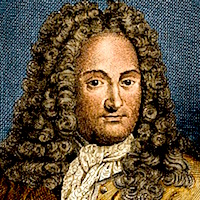 Leibniz LeibnizPolymath, philosopher, mathematician, scientist, engineer, lawyer, university president and “best-of-all-possible-worlds man”; Leibniz developed calculus, invented components that became the first calculator, and refined the binary number system that became the foundation for digital computers. His writings on law and politics and call for a European confederation inaugurated the European Union. One of the first major European intellectuals to study Chinese culture and philosophy, he read Confucius, studied the I Ching, and integrated Chinese wisdom into both his philosophy and physics. It led to his “law of continuity” that linked the nature of everyone—plants, humans, animals, both the organic and inorganic worlds—, created a theoretical foundation for evolution, and envisioned a non-dual calculus of understanding reality. |
| Averroes, Ibn Rushd | 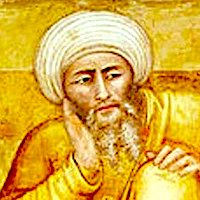 Averroes, Ibn Rushd Averroes, Ibn RushdPolymath, famous Islamic philosopher and scientist, theologian, and physician; Averroes took the position that the Koran and sacred writings were allegories and not to be taken literally. Arguing for an understanding deeper than just the literal meaning of texts, he popularized Aristotle and started a major Jewish and Christian philosophical movement but didn’t become influential in the Muslim world until the 19th century. In fact, during his lifetime, all his books that could be found were burned, he was removed from his positions, and exiled. Dante described him as he "who made the Great Commentary,” Chaucer listed him as a great medical authority, Raphael painted him into a fresco in the Apostolic Palace in the Vatican that depicts major philosophers, Borges featured him in one of his books, and a plant genus, a lunar crater and an asteroid were named after him. |
| Ayaan Hirsi Ali | 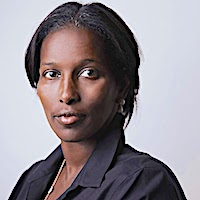 Ayaan Hirsi Ali Ayaan Hirsi Ali Powerful voice for Islamic reform Politician, scholar, powerful and effective voice advocating Islamic reform and the rights of Muslim women; Ayaan Hirsi Ali skillfully opposes the far-too-common practices of forced and child marriage, genital mutilation, and violence against women. After growing up as a devout Muslim, she abandoned her faith and became an insightful critic of Islam and the fundamentalist Islamic laws that oppress women. Her movie Submission precipitated an intense reaction of criticism, death threats, and the murder of her co-filmmaker. Both exemplifying and calling for an Islamic Enlightenment, she exposes the deep and debilitating oppression ingrained in Muslim culture and religion as well as articulating and demonstrating a path toward positive reform. |
| Cheng Zhu | 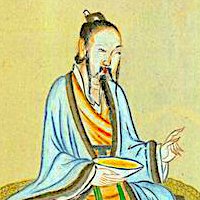 Cheng Zhu Cheng ZhuNeo-Confucian founding uncle Political critic and scholar-official, Cheng Zhu became a major critic of the political policies of his era and an important influence on the development of neo-Confucianism. A philosophical school named after him became a strong influence advocating morality as the foundation for political leadership. |